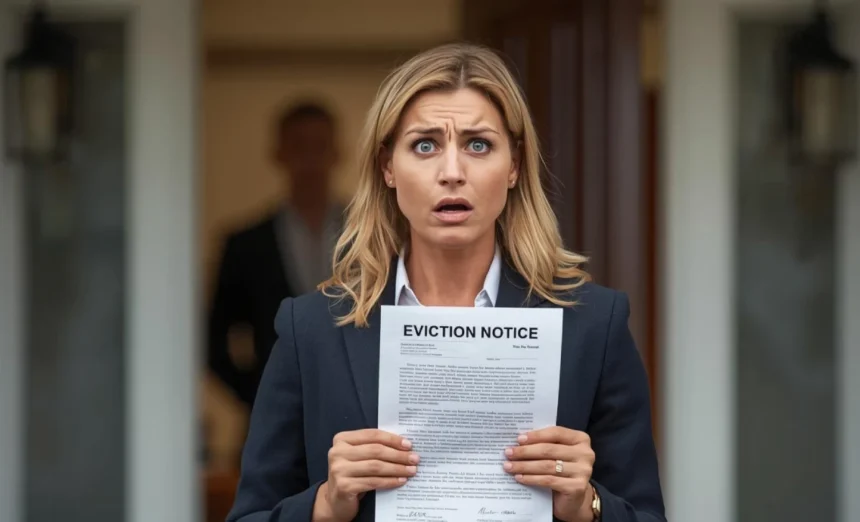Few situations feel more frightening than facing eviction from your rental home. Whether you’ve received a termination notice, been threatened with immediate removal, or heard about landlords changing locks, understanding your legal protections is crucial right now.
- Understanding Tenant Eviction Rights in Australia
- Legal Notice Periods for Eviction Across States
- Lawful vs Unlawful Eviction Practices
- Steps Tenants Can Take If Facing Eviction
- Preventing Eviction Disputes in Future Tenancies
- Conclusion
- FAQs
- Q1: Can a landlord evict you without notice in Australia?
- Q2: How much notice does a landlord need to give a tenant in Australia?
- Q3: What is considered an unlawful eviction in Australia?
- Q4: What should I do if I receive an eviction notice?
- Q5: Can I be evicted for late rent in Australia?
- Q6: Where can I get help if I am facing eviction in Australia?
Here’s what you need to know immediately: No, landlords cannot legally evict you without notice in Australia. Every state and territory has strict laws governing eviction processes, and landlords who bypass these requirements face serious penalties. Your eviction notice tenant rights Australia are strong, and understanding them can mean the difference between unlawful removal and secure housing.
This guide explains exactly what notice periods apply in your state, how to identify unlawful eviction practices, and what urgent steps to take if you’re facing eviction threats. If you’re worried about losing your home, read this carefully—your rights are more powerful than you might realise.
Understanding Tenant Eviction Rights in Australia
Australian tenancy laws provide significant protections against arbitrary or unfair eviction, regardless of which state you live in.
The legal term for eviction is “termination of tenancy,” and it requires landlords to follow strict procedures set out in residential tenancy legislation. These laws exist specifically to prevent sudden homelessness and give tenants time to find alternative accommodation or challenge unjust terminations.
According to the Australian Institute of Health and Welfare’s 2024 housing report, approximately 8% of Australian tenants experience eviction threats annually, but only a fraction of these proceed legally. Many landlords who threaten eviction don’t understand—or deliberately ignore—their legal obligations.
Can a Landlord Evict Without Notice?
The answer is definitely no. Eviction without proper notice is illegal across all Australian states and territories.
Landlords must provide written notice using the correct state-approved forms, specifying valid legal grounds for termination. They cannot simply ask you to leave, change the locks, or remove your belongings without following the proper legal process.
Even when landlords have legitimate grounds for eviction—such as unpaid rent or property damage—they still must provide minimum notice periods and follow tribunal processes. The only entity legally authorised to physically remove tenants from properties is the sheriff’s office or police, and only after a tribunal order has been obtained.
NSW Fair Trading data from 2024 shows that approximately 15% of attempted evictions involve landlords trying to bypass legal notice requirements. These attempts are unlawful, and tenants can seek urgent tribunal intervention plus compensation for illegal eviction attempts.
Key Tenant Rights
Understanding your fundamental eviction notice tenant rights Australia helps you recognise when landlords overstep legal boundaries.
Your protected rights include:
- Security of tenure: You cannot be evicted during a fixed-term lease except for specific legal breaches
- Adequate notice periods: Minimum notice requirements (14 days to 90 days depending on circumstances)
- Right to written notice: All termination notices must be in writing using official forms
- Grounds requirement: Landlords must state valid legal reasons for termination
- Tribunal challenge: You can contest any eviction notice through your state tribunal
- No retaliatory eviction: Landlords cannot evict you for exercising legal rights (like requesting repairs)
- Physical protection: Only authorised officers can physically remove you, never landlords or agents
These rights exist regardless of your visa status, rental history, or relationship with your landlord. Australian tenancy laws protect all residential tenants equally.
If your landlord has threatened eviction because you reported maintenance issues, this could constitute retaliatory eviction—a serious breach of tenancy law. The Tenants’ Union of NSW reports that retaliatory eviction claims increased 22% in 2023-24, with tribunals consistently ruling in tenants’ favour.
Legal Notice Periods for Eviction Across States
Notice period requirements vary significantly across Australian jurisdictions, and understanding your state’s specific rules is essential for protecting your rights.
These legally mandated notice periods give tenants time to secure alternative housing, challenge unfair terminations, or remedy breaches where possible. Landlords who provide insufficient notice invalidate the termination, and you’re entitled to remain in the property.
1. Notice Periods in Each State/Territory
Each Australian state mandates different minimum notice periods depending on termination grounds and tenancy type.
| State | No Grounds (Periodic) | No Grounds (Fixed-Term End) | Breach (Rent) | Serious Breach | Sale of Property |
|---|---|---|---|---|---|
| NSW | 90 days | 30 days | 14 days | Immediate (tribunal) | 30 days |
| Victoria | 60 days | 28 days | 14 days | Immediate (tribunal) | 60 days |
| Queensland | 2 months | 2 weeks | 7 days (if >7 days late) | Immediate (tribunal) | 2 months |
| WA | 60 days | 30 days | 7 days | Immediate (tribunal) | 60 days |
| South Australia | 90 days | 28 days | 14 days | Immediate (tribunal) | 28 days |
| Tasmania | 42 days | 14 days | 14 days | Immediate (magistrate) | 42 days |
| ACT | 26 weeks | 3 weeks | 2 weeks | Immediate (tribunal) | 12 weeks |
| NT | 42 days | 14 days | 14 days | Immediate (tribunal) | 42 days |
Important clarifications:
- Periodic tenancy: A tenancy that continues week-to-week or month-to-month after the fixed term expires
- No grounds termination: Landlord ending tenancy without specific reason (only available for periodic tenancies in most states)
- Breach terminations: Require formal breach notices before termination notices in most cases
Victoria’s rental reforms in 2024 strengthened tenant protections significantly. Landlords can no longer terminate without grounds during periodic tenancies except for specific reasons like landlord moving in, property sale to owner-occupier, or major renovations.
2. Urgent or Immediate Termination Grounds
While most evictions require substantial notice, certain serious breaches allow immediate or very short-notice terminations through tribunal orders.
Grounds for urgent termination include:
- Illegal activity: Using the property for criminal purposes (drug manufacturing, prostitution)
- Serious damage: Intentional or reckless property destruction beyond normal use
- Danger to persons: Violent or threatening behaviour toward neighbours or landlords
- Repeated breaches: Multiple violations of the same tenancy obligation after formal warnings
- False information: Providing fraudulent details to obtain the tenancy
Even for serious breaches, landlords cannot physically evict you themselves. They must apply to the tribunal for an urgent termination order, present evidence of the breach, and obtain a possession order before the sheriff can enforce removal.
Real example: In a 2024 QCAT case, a Brisbane landlord attempted to immediately evict tenants for having an unauthorised pet. The tribunal ruled the eviction unlawful because pets don’t constitute serious breach grounds for immediate termination. The landlord was ordered to pay the tenants $3,500 compensation for unlawful eviction threats.
According to VCAT’s 2023-24 statistics, only 8% of termination applications involve serious breach grounds, and tribunals closely scrutinise these claims to prevent abuse.
Lawful vs Unlawful Eviction Practices
Distinguishing between legal termination processes and illegal eviction tactics is crucial when facing landlord pressure to vacate.
Many tenants unknowingly comply with unlawful eviction demands because they don’t understand their rights. Recognising illegal practices empowers you to stand your ground and seek legal protection.
1. What Is a Lawful Eviction?
Legal eviction follows a strict, multi-step process that protects tenant rights throughout.
The lawful eviction process requires:
- Written termination notice: Using the official state-approved form with correct notice period and valid grounds
- Notice expiry: Waiting the full notice period before any further action
- Tenant doesn’t vacate: If you remain after notice expires, landlord cannot take self-help measures
- Tribunal application: Landlord must apply to the relevant tribunal for a termination and possession order
- Tribunal hearing: Both parties present evidence; tribunal member makes binding decision
- Possession order granted: If tribunal rules for landlord, a possession order is issued
- Compliance deadline: Tribunal order specifies when you must vacate
- Sheriff enforcement: Only if you don’t comply with tribunal order can the sheriff physically remove you
This entire process typically takes 6-12 weeks minimum, even for serious breaches. According to NSW Fair Trading’s 2024 data, the average timeline from termination notice to possession order is 11 weeks.
Crucially, at no point can landlords, agents, or private contractors physically remove tenants, change locks, or interfere with peaceful enjoyment of the property. These actions are criminal offences in most Australian states.
2. Examples of Unlawful Eviction
Illegal eviction practices are surprisingly common, and recognising them protects you from landlord overreach.
Unlawful eviction tactics include:
- Lock changes: Changing locks or access codes without tenant consent or tribunal order
- Utility disconnection: Cutting off electricity, gas, water, or internet to force you out
- Property removal: Taking or disposing of your belongings without legal authority
- Physical intimidation: Threats, harassment, or aggressive behaviour to pressure you to leave
- Unauthorised entry: Repeatedly entering without notice or permission to make you uncomfortable
- Lease abandonment claims: Falsely declaring you’ve abandoned the property when you haven’t
- Self-help eviction: Hiring people to remove you or your possessions
- Withholding keys: Refusing to provide keys or access after you’ve paid rent and bond
Every single one of these actions violates Australian tenancy laws and can result in significant penalties for landlords.
Real case study: In September 2024, an NCAT case involved a Sydney landlord who changed locks while tenants were at work, claiming they were “squatters.” The tribunal ruled this an unlawful eviction, ordered immediate restoration of access, awarded tenants $4,200 for alternative accommodation costs, and referred the landlord to NSW Fair Trading for prosecution. The landlord ultimately faced $11,000 in penalties.
The Tenants’ Union of Victoria reports that unlawful eviction attempts increased 18% in 2023-24, often targeting vulnerable tenants who may not know their rights. Don’t be intimidated—the law is firmly on your side.
If you experience any unlawful eviction tactics, you can:
- Call police immediately (lockouts and utility disconnection may constitute criminal offences)
- Apply for urgent tribunal intervention within 24-48 hours
- Seek compensation for expenses, distress, and rights violations
- Report landlords to your state’s fair trading authority
Steps Tenants Can Take If Facing Eviction
If you’ve received an eviction notice or face eviction threats, taking immediate, strategic action protects your housing rights.
Don’t panic, but do act quickly. Understanding eviction notice tenant rights Australia and following proper procedures dramatically improves your chances of remaining in your home or securing adequate time to relocate.
1. Review the Notice and Check Legality
Your first step is to carefully examine any termination notice against your state’s legal requirements.
Check for these critical elements:
- Correct form: Is it the official state-approved termination notice form?
- Your details: Are your name and property address correct?
- Notice period: Does it provide the minimum required notice for your state and grounds?
- Termination grounds: Is a valid legal reason stated?
- Dates: Is the termination date clearly specified and correctly calculated?
- Landlord details: Is it signed by the landlord or authorised agent?
- Delivery method: Was it properly served according to state requirements?
Even small errors can invalidate termination notices. In a 2024 Victorian case, a termination notice was deemed invalid because it provided 58 days’ notice instead of the required 60 days, forcing the landlord to restart the entire process.
Compare your notice against your state’s tenancy authority website, which provides templates and explanatory guides. NSW Fair Trading, Consumer Affairs Victoria, and RTA Queensland all offer detailed notice validation checklists.
If you identify any errors or inconsistencies, document them immediately. Invalid notices give you strong grounds to challenge termination proceedings.
2. Seek Support and Legal Advice
Don’t face eviction alone. Free legal resources exist throughout Australia specifically to help tenants in your situation.
Immediate support options:
Tenants’ Unions (by state):
- NSW: Tenants’ Union of NSW – 1800 251 101
- Victoria: Tenants Victoria – (03) 9416 2577
- Queensland: Tenants Queensland – (07) 3832 3170
- WA: Circle Green Community Legal – (08) 9221 9322
- SA: SA Tenants’ Association – (08) 8223 2743
- Tasmania: Tenants’ Union of Tasmania – (03) 6223 2641
- ACT: Tenants’ Union ACT – (02) 6247 2011
- NT: Northern Territory Legal Aid Commission – 1800 019 343
Community Legal Centres:
- Provide free legal advice and representation for eligible tenants
- Can help prepare tribunal applications and attend hearings
- Located throughout Australia, find your nearest through www.naclc.org.au
Legal Aid:
- Offers free or low-cost legal representation for serious eviction cases
- Eligibility based on income and case merit
- Can represent you at tribunal hearings
According to the National Association of Community Legal Centres, tenants who receive professional legal advice before tribunal hearings are 3.5 times more likely to achieve favourable outcomes compared to those who represent themselves without preparation.
Time is critical. Contact these services immediately upon receiving a termination notice—don’t wait until the last minute.
3. Apply to the Tribunal
If you believe your eviction is unjust, invalid, or you need more time, applying to your state tribunal can halt or delay the process.
Grounds for challenging termination notices:
- Notice doesn’t comply with legal requirements
- Grounds stated are false or don’t apply to your situation
- Termination is retaliatory (punishment for exercising tenant rights)
- You’ve remedied the breach (e.g., paid outstanding rent)
- Eviction would cause excessive hardship
- Landlord hasn’t fulfilled their obligations (repairs, habitability)
Lodge your tribunal application before the termination date specified in the notice. In most states, applying to contest termination automatically suspends the notice until the tribunal makes a decision.
Application process:
- Complete application form: Available online through your state tribunal website
- Pay application fee: Typically $50-$75 (fee waivers available for financial hardship)
- Attach evidence: Copy of termination notice, lease, correspondence, photos, receipts
- Serve on landlord: Ensure landlord receives a copy of your application
- Attend hearing: Present your case clearly and respectfully
Real outcome: In March 2024, a Gold Coast tenant facing eviction for alleged rent arrears applied to QCAT with bank statements proving all rent had been paid. The tribunal dismissed the termination notice, ordered the tenancy to continue, and required the landlord to pay the tenant’s $73 application fee plus $500 compensation.
Even if you ultimately need to vacate, tribunal intervention can secure additional time (often 30-90 days) to find alternative housing, which is vastly better than sudden homelessness.
Preventing Eviction Disputes in Future Tenancies
While understanding eviction notice tenant rights Australia is crucial, preventing eviction situations altogether through proactive tenancy management is even better.
Learning from challenging experiences helps you approach future rentals strategically, reducing the risk of termination disputes and building positive landlord relationships that encourage lease renewals.
Essential eviction prevention practices:
Maintain consistent rent payments:
- Set up automatic payments on or before rent due dates
- Keep detailed payment records (bank statements, receipts)
- Communicate immediately if financial hardship occurs—don’t wait until arrears accumulate
- Consider Centrepay for rental payments if receiving government benefits
Care for the property responsibly:
- Report maintenance issues promptly before they worsen
- Keep the property reasonably clean and tidy
- Conduct regular inspections of appliances and systems
- Address small issues before they become damage
- Follow proper rubbish disposal and garden maintenance
Communicate professionally and promptly:
- Respond to landlord/agent communications within 24-48 hours
- Always communicate in writing to create records
- Be honest about any issues or concerns
- Request maintenance and repairs through proper channels
- Keep emotions controlled in difficult conversations
Understand lease obligations before signing:
- Read the entire tenancy agreement carefully
- Clarify any unclear terms before signing
- Understand pet policies, subletting rules, and modification restrictions
- Note all maintenance responsibilities assigned to you
- Keep a copy of your signed lease accessible throughout tenancy
Document everything continuously:
- Take entry photos and videos from all angles
- Maintain records of all repairs requested and completed
- Save all emails and written correspondence
- Keep receipts for any tenant-paid maintenance
- Document property condition regularly throughout tenancy
According to research by Tenants Queensland, tenants who maintain consistent communication and pay rent reliably are 85% less likely to face termination proceedings compared to tenants with erratic payment patterns or poor communication.
Building a positive rental history also improves your references for future properties, making it easier to secure quality rentals in competitive markets.
Conclusion
The answer is clear: landlords cannot evict you without notice in Australia. Every state provides strong eviction notice tenant rights Australia that require proper written notice, valid grounds, and tribunal processes before any physical removal can occur.
If you’re facing eviction, remember that you have time and legal options. Examine the notice for validity, seek immediate support from tenants’ unions or legal aid, and don’t hesitate to challenge unlawful terminations through your state tribunal. Australian tenancy laws exist specifically to protect you from arbitrary or unfair eviction.
Never surrender to illegal eviction tactics like lock changes or utility disconnection. These actions violate criminal law, and you’re entitled to police assistance and tribunal compensation. Your housing security matters, and the legal system will enforce your rights.
Are you currently facing eviction threats or have you successfully challenged an unlawful eviction? Share your experience in the comments to help other Australian tenants understand their rights and options.
FAQs
Q1: Can a landlord evict you without notice in Australia?
No. In every Australian state and territory, landlords must provide written notice before ending a tenancy. Evicting a tenant without notice is unlawful and can be challenged at a tenancy tribunal.
Q2: How much notice does a landlord need to give a tenant in Australia?
Notice periods vary by state and the reason for eviction. For example:
- NSW: 30–90 days depending on grounds
- VIC: 14 days for unpaid rent, 60–120 days for no specified reason
- QLD: 7–90 days depending on the situation
Always check your state’s tenancy authority for exact timeframes.
Q3: What is considered an unlawful eviction in Australia?
Unlawful eviction includes changing locks, cutting utilities, removing tenant belongings, or forcing tenants out without a valid notice or tribunal order. These actions are illegal and tenants can seek compensation.
Q4: What should I do if I receive an eviction notice?
Review the notice carefully and compare it with your state’s legal requirements. If it seems invalid, contact your local tenancy advice service or apply to your state’s tribunal (e.g., NCAT, VCAT, QCAT) to challenge it.
Q5: Can I be evicted for late rent in Australia?
Yes, landlords can issue a termination notice if rent is overdue beyond the grace period (often 14 days). However, if you pay the rent owing before the notice period expires, the eviction may be cancelled.
Q6: Where can I get help if I am facing eviction in Australia?
You can seek help from:
- Tenants’ Union in your state or territory
- Legal Aid or community legal centres
- Your state’s tenancy authority (e.g., Fair Trading NSW, Consumer Affairs Victoria, RTA QLD)






